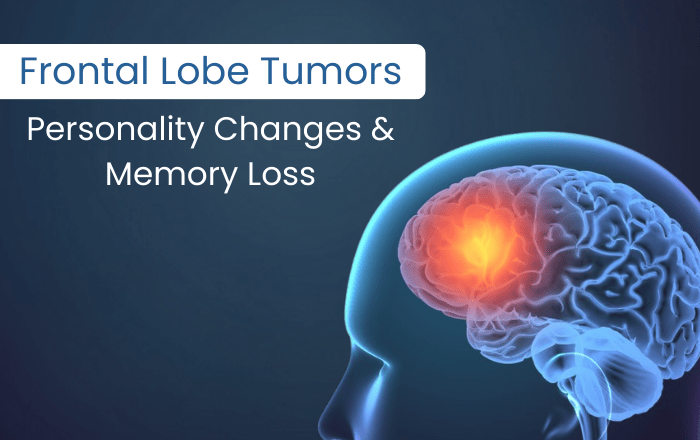The brain is the command center of our body, controlling everything from movement to emotions. One of its most important parts is the frontal lobe, responsible for decision-making, memory, problem-solving, and personality. When a tumor develops in this area, it can cause noticeable changes in behavior and memory.
Have you noticed a loved one becoming more forgetful, easily irritated, or acting in ways that seem out of character? These symptoms may not just be a sign of aging or stress but could indicate a frontal lobe tumor. Understanding the connection between these tumors and changes in personality and memory can help in seeking timely medical attention.
Understanding the Frontal Lobe & Its Role
The frontal lobe is located at the front of the brain, just behind the forehead. It plays a major role in:
✅ Decision-making and reasoning
✅ Controlling emotions and social behavior
✅ Memory formation and recall
✅ Problem-solving and planning
✅ Voluntary movements
Because it influences personality and thought processes, any damage to this area, including a tumor, can lead to significant changes in behavior, emotions, and memory.
What Causes Frontal Lobe Tumors?
A brain tumor in the frontal lobe can develop for various reasons. Some of the common causes include:
- Primary brain tumors – These start in the brain itself, such as gliomas, meningiomas, and astrocytomas.
- Metastatic tumors – Cancers from other parts of the body (such as lung or breast cancer) can spread to the brain.
- Unknown causes – In many cases, the exact cause of a brain tumor remains unclear, though genetic factors and exposure to radiation may play a role.
Not all frontal lobe tumors are cancerous, but even benign (non-cancerous) tumors can press on brain tissue and cause severe symptoms.
Personality Changes Due to Frontal Lobe Tumors
A tumor in the frontal lobe can significantly impact behavior and emotions. Family members may notice:
🔹 Mood swings – Sudden anger or irritability with no clear reason.
🔹 Loss of inhibition – Saying or doing inappropriate things in social situations.
🔹 Lack of motivation – Difficulty starting or completing tasks.
🔹 Emotional detachment – Reduced empathy and disinterest in relationships.
🔹 Impulsivity – Acting without thinking, making reckless decisions.
For example, a person who was once calm and collected may suddenly start behaving aggressively or seem uninterested in their loved ones. These changes can be distressing for both the patient and their family.
Memory Loss & Cognitive Decline
Memory problems are another common symptom of frontal lobe tumors. The person may:
- Forget recent conversations or events.
- Have difficulty concentrating or staying focused.
- Struggle with organizing thoughts or solving problems.
- Repeat themselves frequently without realizing it.
This can affect their work, relationships, and ability to live independently. Family members might notice them leaving tasks unfinished or misplacing things more often than usual.
Diagnosis & When to See a Doctor
It’s easy to overlook early symptoms of a frontal lobe tumor, mistaking them for stress, aging, or mental health conditions. However, if you or someone you know is experiencing personality shifts, memory issues, or unusual behavior, it’s essential to see a doctor.
Tests & Diagnosis
🔍 Neurological exam – Checking reflexes, muscle strength, and coordination.
🔍 MRI or CT scan – Imaging tests to detect tumors in the brain.
🔍 Cognitive tests – Assessing memory, reasoning, and language skills.
A timely diagnosis can lead to better treatment options and improve quality of life.
Treatment Options for Frontal Lobe Tumors
Treatment depends on the tumor’s size, location, and type. Common options include:
✔ Surgery – Removing as much of the tumor as possible without damaging healthy brain tissue.
✔ Radiation therapy – Targeting tumor cells to stop their growth.
✔ Chemotherapy – Using medications to shrink or destroy cancer cells.
✔ Rehabilitation therapy – Helping patients regain lost cognitive or physical functions.
The sooner a treatment plan is started, the better the chances of managing symptoms and preventing further complications.
Meet Dr. Ninad Patil – Brain Surgeon in Pune
If your loved one is experiencing memory loss, personality changes, or other symptoms of a frontal lobe tumor, it’s important to consult a specialist.
Dr. Ninad Patil is a well-known brain surgeon in Pune with extensive experience in diagnosing and treating brain tumors. His approach focuses on patient well-being, providing guidance at every step of the treatment process.
For appointments, consultations, or more information, contact Dr. Ninad Patil today.
Frequently Asked Questions (FAQs)
Q1: Can a frontal lobe tumor change a person’s personality completely?
Yes, it can cause significant personality shifts, making a person more impulsive, aggressive, or emotionally distant. However, treatment can help manage these changes.
Q2: Is memory loss from a frontal lobe tumor permanent?
Memory problems may improve with treatment, depending on the size and location of the tumor and how early it was detected.
Q3: What is the best treatment for a frontal lobe tumor?
Treatment options vary based on the tumor’s type and severity. Surgery, radiation, and therapy are common approaches. Consulting a brain specialist can help determine the best course of action.
Frontal lobe tumors can cause significant personality and memory changes, affecting daily life and relationships. If you notice persistent symptoms in yourself or a loved one, don’t ignore them. Seeking medical advice early can make a difference in managing the condition.
If you’re in Pune, schedule a consultation with Dr. Ninad Patil, a trusted brain surgeon who has helped many patients navigate their treatment journey.
👉 Take the first step toward better brain health – Contact Dr. Ninad Patil today!



